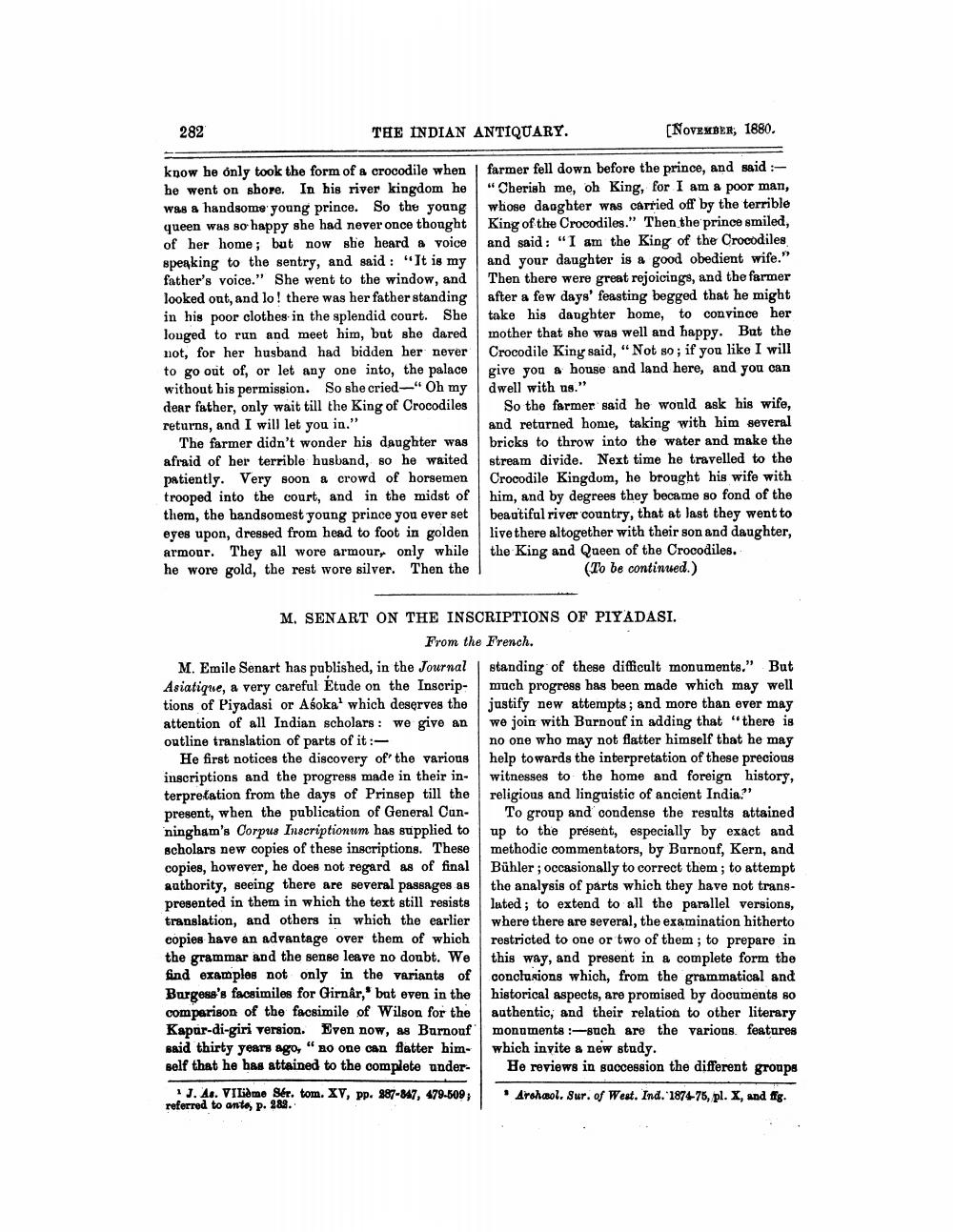________________
282
THE INDIAN ANTIQUARY.
[NOVEMBER, 1880.
know he only took the form of a crocodile when he went on shore. In his river kingdom he was a handsome young prince. So the young queen was so happy she had never once thought of her home; but now she heard a voice speaking to the sentry, and said: "It is my father's voice." She went to the window, and looked out, and lo! there was her father standing in his poor clothes in the splendid court. She louged to run and meet him, but she dared not, for her husband had bidden her never to go out of, or let any one into the palace without his permission. So she cried_"Oh my dear father, only wait till the King of Crocodiles returns, and I will let you in."
The farmer didn't wonder his daughter was afraid of her terrible husband, so he waited patiently. Very soon a crowd of horsemen trooped into the court, and in the midst of them, the handsomest young prince you ever set eyes upon, dressed from head to foot in golden armour. They all wore armour, only while he wore gold, the rest wore silver. Then the
farmer fell down before the prince, and said :"Cherish me, oh King, for I am a poor man, whose daughter was carried off by the terrible King of the Crocodiles." Then the prince smiled, and said: "I am the King of the Crocodiles and your daughter is a good obedient wife." Then there were great rejoicings, and the farmer after a few days' feasting begged that he might take his daughter home, to convince her mother that she was well and happy. But the Crocodile King said, "Not so; if you like I will give you a house and land here, and you can dwell with us."
So the farmer said he would ask his wife, and returned home, taking with him several bricks to throw into the water and make the stream divide. Next time he travelled to the Crocodile Kingdom, he brought his wife with him, and by degrees they became so fond of the beautiful river country, that at last they went to live there altogether with their son and daughter, the King and Queen of the Crocodiles.
(To be continued.)
M. SENART ON THE INSCRIPTIONS OF PIYADASI.
From the French. M. Emile Senart has published, in the Journal standing of these difficult monuments." But Asiatique, a very careful Etude on the Inscrip- much progress has been made which may well tions of Piyadasi or Asoka' which deserves the justify new attempts; and more than ever may attention of all Indian scholars: we give an we join with Burnouf in adding that "there is outline translation of parts of it:
no one who may not flatter himself that he may He first notices the discovery of the various help towards the interpretation of these precious inscriptions and the progress made in their in- witnesses to the home and foreign history, terpretation from the days of Prinsep till the religious and linguistic of ancient India." present, when the publication of General Cun- To group and condense the results attained ningham's Corpus Inscriptionum has supplied to up to the present, especially by exact and scholars new copies of these inscriptions. These methodic commentators, by Barnouf, Kern, and copies, however, he does not regard as of final Bühler; occasionally to correct them; to attempt authority, seeing there are several passages as the analysis of parts which they have not transpresented in them in which the text still resists luted; to extend to all the parallel versions, translation, and others in which the earlier where there are several, the examination hitherto copies have an advantage over them of which restricted to one or two of them; to prepare in the grammar and the sense leave no doubt. We this way, and present in a complete form the find examples not only in the variants of conclusions which, from the grammatical and Burgess's facsimiles for Girnår,' bat even in the historical aspects, are promised by documents so comparison of the facsimile of Wilson for the authentic, and their relation to other literary Kapur-di-giri version. Even now, as Burnonfmonuments :-such are the various features Baid thirty years ago," no one can flatter him- which invite a new study. self that he has attained to the complete under He reviews in succession the different groups
* J. A.. VIlidme sér. tom. XV, pp. 987-847, 479-509, Arshaol. Sur. of West. Ind. 1874-76, pl. X, and ffg. referred to ante, p. 289.




